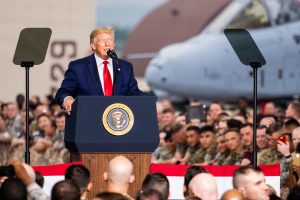U.S. President Donald Trump is aware of the strategic importance of a trilateral security alliance among the U.S., Japan, and South Korea to counter China’s ascending power. His administration considers these two Asian countries essential allies for maintaining collective security.
However, his recent foreign policy actions may hinder trilateral cooperation among these allies, as he may put too much pressure on South Korea and Japan.
For example, Trump plans to impose a 25 percent tariff on imported goods from South Korea if he does not secure a favorable trade agreement by August 1. He is also demanding a significant bump in South Korea’s share of the costs for hosting U.S. troops stationed near Seoul and an increase in the country’s annual military expenditures.
While these demands aim to advance U.S. interests, they could unintentionally destabilize South Korea’s government and drive Lee Jae-myung, the newly elected president, closer to China, the most formidable U.S. rival.
Currently, the negative ramifications of Trump’s arm-twisting are minimal, as Lee is making every effort to meet Trump’s demands. Well aware of the crucial role the U.S. plays in South Korea’s security, Lee has dispatched all his top staff members to negotiate with their U.S. counterparts. He hopes to finalize a deal with Trump at a summit meeting as quickly as possible.
During his first term, Trump persuaded South Korea to reduce its economic engagement with China, which had been its most beneficial trading partner.
Seoul’s foreign policy used to aim to strengthen national security with the support of the U.S. military, while simultaneously fostering economic growth through cooperation with China. Interestingly, the substantial trade revenues generated from China enabled Seoul to acquire additional military assets from the U.S., such as fighter jets and Apache attack helicopters.
However, Trump disapproved of Seoul’s close economic ties with Beijing and pressured the South Korean government to decrease its trade with China. In response, Seoul favorably adjusted its trade volume.
Trump appeared to have won, as South Korea has recorded a trade deficit with China since 2023. Additionally, as of 2025, South Korea’s exports to China have become comparable to its exports to the U.S.
In other words, since the late 2010s, Seoul has sacrificed a substantial amount of trade profit from China to cherish its long-term friendship with Washington.
With the start of his second term, Trump’s foreign policy agenda has shifted its focus toward addressing the trade deficit with South Korea, rather than enhancing the trilateral security arrangement. This shift is understandable, considering that the U.S. goods trade deficit with South Korea reached $66 billion in 2024, marking a 29.2 percent increase since 2023.
Nevertheless, as Seoul attempts to address the trade imbalance with the U.S. to meet Washington’s demands, it is experiencing a notable decline in national revenue. The initial blow came from the decrease in trade revenue with China – another of Trump’s demands. If Seoul encounters further economic losses, it may struggle to maintain its purchases of U.S. weapons, cover the additional defense costs for U.S. Forces Korea, and raise its overall military expenditures.
Furthermore, Trump’s high tariffs could destabilize the new South Korean government. The opposition could portray any resulting economic trouble as a failure on Lee’s part to protect national interests. They might also present any discord with Trump as evidence of Lee’s incompetence in foreign policymaking.
Growing domestic opposition may prompt Lee, who is left-leaning and pragmatic, to seek to reduce South Korea’s dependence on the dollar for international trade and re-establish close ties with China, which had previously provided significant trade benefits for South Korea.
Lee’s outreach to China could gain momentum if the trade dispute reignites anti-American sentiment among his left-leaning supporters. Anti-Americanism was a serious concern in the late 1980s and early 1990s, with many Koreans chanting “Yankee go home” during street protests in response to what they saw as U.S. interference in South Korea’s domestic politics.
If Lee cannot reach acceptable trade terms with Trump at a summit before September 3, he will likely meet with Chinese President Xi Jinping first. September 3 marks the 80th anniversary of China’s Victory Day, commemorating Japan’s surrender after its defeat by the U.S. in the Pacific War. Xi has invited Lee to the Victory Day celebrations; then-South Korean President Park Geun-hye had attended the 70th anniversary event back in 2015.
If Lee accepts Xi’s invitation before having a face-to-face conference with Trump, this would break tradition, as newly elected South Korean presidents typically meet with the U.S. president first. If Lee and Xi celebrate together in Beijing this September, the world will likely speculate that the U.S. is losing its key Asian ally to China.
To avoid this unfavorable scenario, Trump should refrain from imposing excessive burdens on South Korea. After all, Seoul has consistently upheld a free trade agreement with the U.S. for over a decade, demonstrating good faith.
Additionally, South Korea has a long history of supporting the United States’ global leadership. The country fought alongside American forces in the Vietnam War and the Gulf War, has been one of the largest importers of U.S. weapons, and hosts the United States’ largest overseas military base, the home of U.S. Forces Korea.
In sum, strengthening the security alliance with South Korea while easing trade tensions with Lee would better align with the national interests of the United States.

































